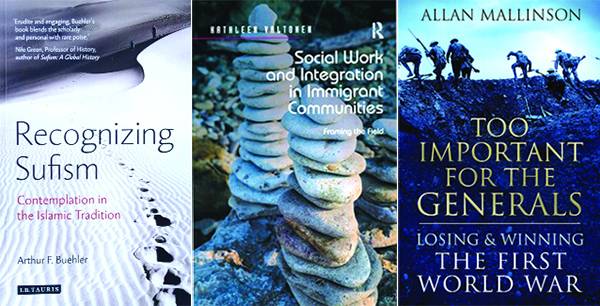
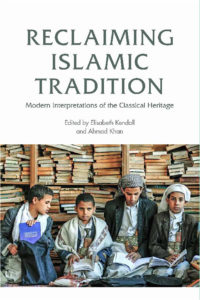
Reclaiming Islamic Tradition: Modern Interpretations of the Classical Heritage
Edited by Elisabeth Kendall and Ahmad Khan
Edinburgh (hardcover), 2016
PRs 9200
Recent events in the Islamic world have demonstrated the endurance, neglect, and careful reshaping of the classical Islamic heritage. A range of modern Islamic movements and intellectuals has sought to reclaim certain concepts, ideas, persons, and trends from the Islamic tradition. This book profiles some of the fundamental debates that have defined the conversation between the past and the present in the Islamic world. Qur’anic exegesis, Islamic law, gender, violence, and eschatology are just some of the key themes in this study of the Islamic tradition’s vitality in the modern Islamic world. This book will allow readers to situate modern developments in the Islamic world within the longue durée of Islamic history and thought.
About the Authors
Elisabeth Kendall is Senior Research Fellow in Arabic and Islamic Studies at Pembroke College, University of Oxford. Her research focuses on how Arabic cultural production fuels political and militant movements. Her books include Twenty-First Century Jihad (with Ewan Stein, 2015), Literature, Journalism and the Avant-Garde (2006) and Media Arabic (2nd ed. 2012). She has studied and worked at the Universities of Oxford, Harvard and Edinburgh.
Ahmad Khan is postdoctoral researcher at Universität Hamburg, Asien-Afrika-Institut. In 2014-15, he was Lecturer in Islamic Studies at the University of Oxford, Faculty of Oriental Studies. His D.Phil (Oxon) examined discourses of heresy and the formation of medieval Sunni orthodoxy. His current research focuses on the history of medieval Iran. His second research specialism concerns modern Islamic history/thought, particularly the emergence of publishing houses and editors in the Islamic world.
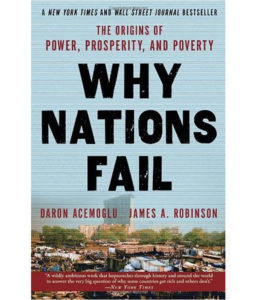
Why Nations Fail: The Origins of Power, Prosperity, and Poverty
Daron Acemoglu and James A Robinson
Crown Business (paperback), 2016
PRs 1595
Is it culture, the weather, geography? Perhaps ignorance of what the right policies are?
Simply, no. None of these factors is either definitive or destiny. Otherwise, how to explain why Botswana has become one of the fastest growing countries in the world, while other African nations, such as Zimbabwe, the Congo, and Sierra Leone, are mired in poverty and violence?
Daron Acemoglu and James Robinson conclusively show that it is man-made political and economic institutions that underlie economic success (or lack of it). Korea, to take just one of their fascinating examples, is a remarkably homogeneous nation, yet the people of North Korea are among the poorest on earth while their brothers and sisters in South Korea are among the richest. The south forged a society that created incentives, rewarded innovation, and allowed everyone to participate in economic opportunities. The economic success thus spurred was sustained because the government became accountable and responsive to citizens and the great mass of people. Sadly, the people of the north have endured decades of famine, political repression, and very different economic institutions—with no end in sight. The differences between the Koreas is due to the politics that created these completely different institutional trajectories.
Based on fifteen years of original research Acemoglu and Robinson marshall extraordinary historical evidence from the Roman Empire, the Mayan city-states, medieval Venice, the Soviet Union, Latin America, England, Europe, the United States, and Africa to build a new theory of political economy with great relevance for the big questions of today, including:
- China has built an authoritarian growth machine. Will it continue to grow at such high speed and overwhelm the West?
- Are America’s best days behind it? Are we moving from a virtuous circle in which efforts by elites to aggrandize power are resisted to a vicious one that enriches and empowers a small minority?
- What is the most effective way to help move billions of people from the rut of poverty to prosperity? More
philanthropy from the wealthy nations of the West? Or learning the hard-won lessons of Acemoglu and Robinson’s breakthrough ideas on the interplay between inclusive political and economic institutions?
Why Nations Fail will change the way you look at—and understand—the world.
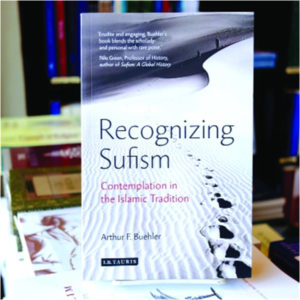
Recognizing Sufism: Contemplation in the Islamic Tradition
Arthur F Buehler
I B Tauris (paperback), 2016
PRs 2465
Sufism is all too often associated just with “mysticism” in the West. The author of this new textbook, a former pupil of Annemarie Schimmel, suggests that conflating Sufism and mysticism is only partially valid. He shows that the vast majority of Sufi practice, both historically and in the contemporary world, has little or nothing to do with a esoteric transcendence, but is rather focused on contemplative activity. Such practice might involve art, music, devotional shrine visitation?even politics and psychology. Placing Sufism in a wider Islamic contemplative context enables Arthur F. Buehler to examine Sufi history, as well as current application, against a backdrop that is richer and more inclusive than that portrayed in many competing introductory surveys. Discussing the origins of Sufism; the development of Sufi lineages (via three founder figures); Sufi lodges and the role of Sufism in colonial resistance; Sufi poetry; Sufi shrines, and Sufism in the West, the author rescues his topic from the idea that it means only union with the divine. In this original new treatment, Sufism emerges as complex and multi-layered.
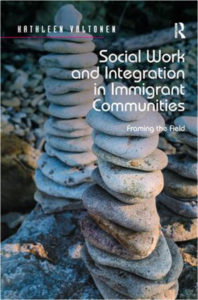
Social Work and Integration in Immigrant Communities: Framing the Field
Hathleen Valtonen
Ashgate (hardcover), 2016
PRs 9865
There has been a marked rise in global migration with many former countries of emigration becoming immigration destinations. As a result of this, social workers increasingly encounter immigrant clients and are called upon to work in their communities. At the same time, in the field of research, theories, conceptual frames, perspectives and discourse have materialized and evolved to make sense of contemporary events. Social work professionals, researchers and students must, therefore, need to be apprised of current thinking, research and discourse in the field of integration. Valtonen familiarizes the reader with the variation in national policies, institutional arrangements and service responses, which all provide rich contrasts and insights into a breadth of policy possibilities. Since macro-level developments in migration carry direct implications for social work as a discipline and a profession with a central stake and role in immigrant wellbeing, this book provides salient information to help with visioning in the profession, defining appropriate and concerted responses, and building robust standing in the field as well as promoting the linking of disciplinary and multidisciplinary research with practice.
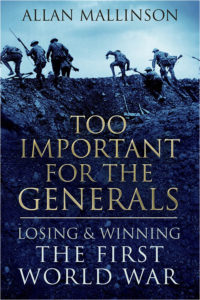
Too Important for the Generals: Losing & Winning the First World War
Allan Mallinson
Bantam Press (paperback), 2016
PRs 1995
One of the great questions in the ongoing discussions and debate about the First World War is why did winning take so long and exact so appalling a human cost? After all this was a fight that, we were told, would be over by Christmas.
Now, in his major new history, Allan Mallinson, former professional soldier and author of the acclaimed 1914: Fight the Good Fight, provides answers that are disturbing as well as controversial, and have a contemporary resonance. He disputes the growing consensus among historians that British generals were not to blame for the losses and setbacks in the ‘war to end all wars’ – that, given the magnitude of their task, they did as well anyone could have. He takes issue with the popular view that the ‘amateur’ opinions on strategy of politicians such as Lloyd George and, especially, Winston Churchill, prolonged the war and increased the death toll. On the contrary, he argues, even before the war began Churchill had a far more realistic, intelligent and humane grasp of strategy than any of the admirals or generals, while very few senior officers – including Sir Douglas Haig – were up to the intellectual challenge of waging war on this scale. And he repudiates the received notion that Churchill’s stature as a wartime prime minister after 1940 owes much to the lessons he learned from his First World War ‘mistakes’ – notably the Dardanelles campaign – maintaining that in fact Churchill’s achievement in the Second World War owes much to the thwarting of his better strategic judgement by the ‘professionals’ in the First – and his determination that this would not be repeated.
Mallinson argues that from day one of the war Britain was wrong-footed by absurdly faulty French military doctrine and paid, as a result, an unnecessarily high price in casualties. He shows that Lloyd George understood only too well the catastrophically dysfunctional condition of military policy-making and struggled against the weight of military opposition to fix it. And he asserts that both the British and the French failed to appreciate what the Americans’ contribution to victory could be – and, after the war, to acknowledge fully what it had actually been.

